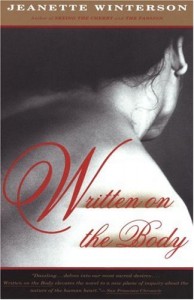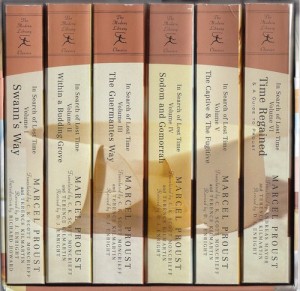On the End of Love
 Written on the Body
Written on the Body
by Jeanette Winterson
Vintage, February 1994
192 pages / $14.95 Buy from Amazon
&
To the Wonder
Dir. Terrence Malick
2012
I
To put it another way
I would give all metaphors
in return for one word
drawn out of my breast like a rib
for one word
contained within the boundaries
of my skin
but apparently this is not possible
and just to say – I love
I run around like mad
picking up handfuls of birds– Zbigniew Herbert “I Would Like To Describe”
The greatest irony for a writer, a person obsessed with language is to run into the boundaries of words. In our intense, overwhelming moments these faithful friends fail us when we need them most. All artists seek to express something, but what do you do at the end of expression?
That we call the ineffable the “ineffable” points to the paucity of our expressive capabilities. This is both a universal and a poignant contemporary problem. Post-modernity, while often exaggerated, highlighted the strange duality of living in a world constructed by words and the attending inability to transcend the world of words. From time immemorial artists understood the inability to translate the wondrous into a chain of letters and symbols, but with the accretion of time the problem of clichés grew, leaving many to shrug in cynicism at our inability to say anything new or urgent.
II
“Love demands expression. It will not stay still, stay silent, be good, be modest, be seen and not heard, no. It will break out in tongues of praise, the high note that smashes the glass and spills the liquid.”
– Jeanette Winterson, Written on the Body
It would be the greatest torture, if love really could contain such a self-contradiction, for love to require itself to keep hidden, to require its own unrecognizability.
– Soren Kierkegaard, Works of Love.
No topic has seemed to run its course more than our abiding obsession with love. We like to think of this obsession as timeless. We recall Shakespeare’s sonnets, and the urgings of Jesus, but love rarely engendered this kind of devotion as it does in our time. In an increasingly secular and secularized world, Love has become our universal religion, our God, the altar at which we pray. It provides the foundational meaning of our lives and defines our pursuits. In our zeal and haste we’ve plundered the emotion, the experience, the concept leaving it bloodied, bruised, depleted. No sentence has more fill-ins than the sentence Love is_________.
Yet, as Winterson writes eloquently, love does demand expression. An unexpressed love is hidden, narcissistic, predatory, and painful. In the same breath Winterson writes, “It’s the clichés that cause the trouble.” There is no greater cliché than “I love you” and yet, there is nothing that needs expression more than love.
A sort of artistic paradox.
Clichés about love not only threaten the ability to express our deepest emotions and thoughts, but force us to experience love in the shadows of other people’s conception.
Do you fall into love, or create it? Does love grow or wither, does it overtake your life? Does it matter?
READ MORE >
August 16th, 2013 / 10:55 am
Leaving Proust
Part 1
I recently finished Marcel Proust’s seven-volume novel In Search of Lost Time. As I read the last sentence, which appropriately ends with the word “Time,” (clever Proust, very clever) I felt a range of unexpected thoughts and emotions. I knew that I deserved the biggest cookie in the world. I also wanted a sign from the universe to acknowledge this labor of love, because I could be sure as shit that no one else in the world would really care about this personal accomplishment. I just wanted to brag and walk around the city, challenging people by saying, “Hey, I just finished the longest novel ever, what, do somethin!” though I realized that most people would laugh at my pretentiousness. So, instead, embracing the dorkiness of the endeavor, I write about my experience and will wait for the countless plaudits and emails to race my way. Here we go! (Disclaimer: If I sound a bit oh-look-at-me pretentious, please forgive me, I deserve something for this effort. LET ME HAVE THIS.)
Some context/backdrop: Proust and his posthumous publishers split up his over 3,000 page novel into seven volumes. That comes out to over 1 million words, and if you’ve ever tried to read any of his volumes, you know the most prohibitive parts are the never ending sentences and paragraphs. You need to forget about that frequent reinforcement you get in reading that comes from the end of a sentence, paragraph or chapter. This in no way exists in Proust, and you need to give up any expectation of those consistent reinforcements that allow us to finish long literature. This takes time to get over, and I don’t know anyone who can say that the beginning of Proust was smooth or easy sailing. It takes time to learn how to read the book, though Proust will teach you the best way to read his writing, which is very nice of him.
I read this novel over a period of five months, from June to October, but I must mention that I attempted to read the first volume, Swann’s Way, at least twice before to little success. The first two times I made this endeavor, I actually grew to hate Proust. In my arrogance I thought that if I could not even get through one page, then the problem must lie in the author, not in me, the great reader. I soon realized that, attempting to read Proust, even at the age of 21, and then 23, I was neither mentally nor intellectually prepared. It requires some real high level discipline, patience, and even more patience. (If Proust gave me anything, and I would contend that he gave me a lot, he at least gave me a widened attention span. Now, I’ve moved on to reading all of Tolstoy and I find his large books breezy compared to Proust.)
December 28th, 2012 / 12:00 pm
Jennifer Egan’s Black Box
The New Yorker recently tweeted, for an hour each night, for ten nights, Jennifer Egan’s new short story/prose poem Black Box. Here, I attempt to review the story and the effort in the same medium in which it was disseminated: through sentences that contain 140 characters or less.
1
Virginia Woolf freed the literary critic from the fetters of the artist.
She simply pointed out that literary criticism uses the same tools as the writer.
We do not paint a criticism of a Matisse.
We do write a review of Tolstoy.
This accidental overlap allows the reviewer to vie for power with the author;
To somehow win a war of words where mimicry transforms into mastery.
June 6th, 2012 / 12:00 pm

